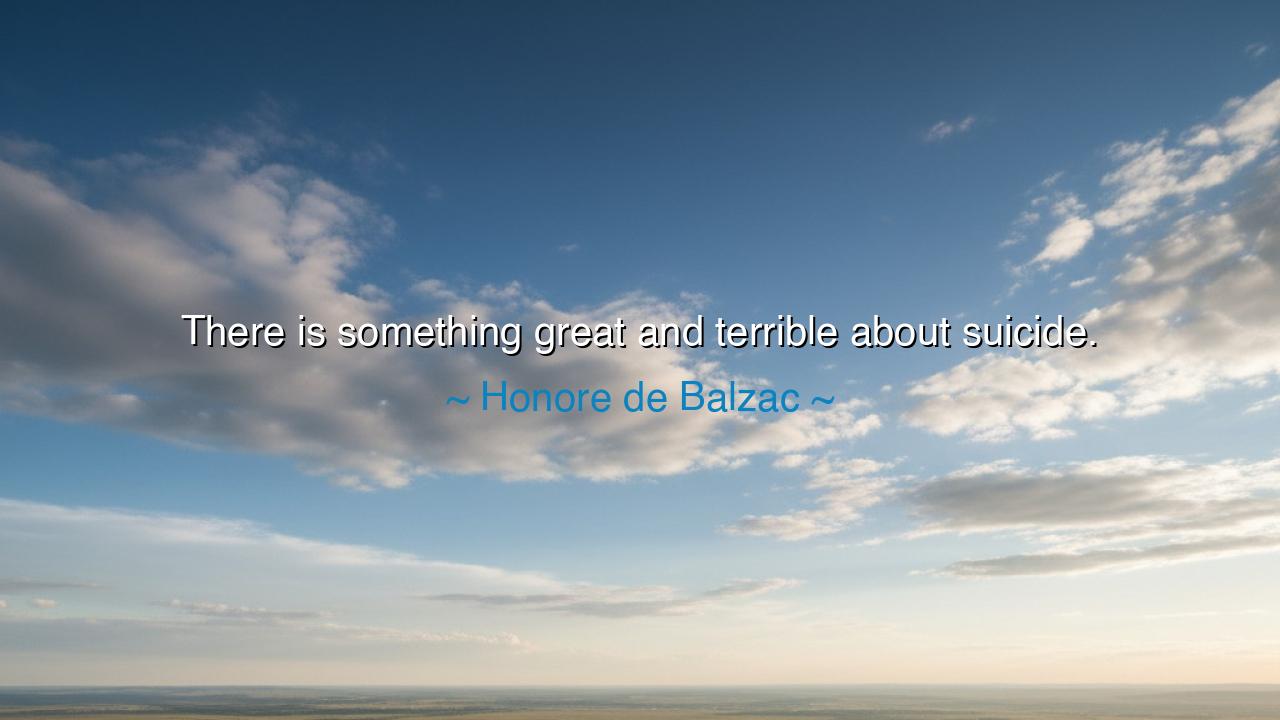
There is something great and terrible about suicide.






“There is something great and terrible about suicide.” Thus wrote Honoré de Balzac, the great chronicler of the human soul, whose pen captured both the majesty and the misery of life. In this short and haunting phrase, he touches upon one of the most profound and painful mysteries of existence — the human confrontation with despair, with choice, and with the limits of endurance. His words are not an endorsement, nor a condemnation; they are an acknowledgment of the awe and terror bound together in the act of self-destruction. For Balzac saw in suicide both the greatness of will — the defiance of the human spirit — and the terrible sorrow of a heart crushed beneath the weight of its suffering.
To the ancients, this paradox was well known. The philosophers of Greece and Rome often debated the morality and meaning of suicide. To Stoics like Seneca, it was a final act of freedom, a way for the soul to escape degradation and remain master of itself. To others, like the early Christians, it was a tragedy, a rebellion against the divine order that grants life as a sacred gift. Balzac, writing centuries later in an age of reason and romantic torment, understood both truths. He saw that in the moment of suicide, humanity reveals its double nature — the divine fire that dares to choose, and the mortal frailty that cannot bear the pain of being. Thus, he called it both “great” and “terrible,” for within that single act dwell both courage and despair, power and defeat.
Balzac lived in a world filled with hardship — the Paris of the nineteenth century, where poverty, passion, and ambition often collided in ruin. He saw men destroyed by failure, women broken by shame, and dreamers consumed by disappointment. In his novels, characters like Lucien de Rubempré in Lost Illusions embody this truth. Lucien, once radiant with talent and hope, is gradually crushed by corruption and betrayal. When he can no longer bear the ruin of his ideals, he ends his life. Balzac portrays this not as an act of weakness, but as a moment of tragic grandeur — a human being claiming agency over his suffering, yet surrendering to it all the same. Through him, Balzac shows that suicide stands at the threshold between defiance and surrender, a flame that both illuminates and consumes.
There is, indeed, something great about it — not in the act itself, but in what it reveals of the human spirit. To contemplate ending one’s life is to recognize, however darkly, that life has meaning, and that meaning has been lost or corrupted. The very awareness of despair is proof that one has felt deeply, has longed for beauty, truth, or love. To reach the brink of suicide is to confront the ultimate question — whether existence itself is worth enduring — and that is a question only beings of consciousness and courage can ask. Yet therein lies the terrible side: that such courage turns inward, consuming rather than transcending; that the will, made for creation, turns instead toward annihilation. It is a reversal of the divine order — a storm of power turned upon the self.
The ancients often sought meaning in such moments of darkness. Consider Socrates, who accepted death with calmness after being condemned by his city. Though his death was not self-inflicted, his acceptance of it carried the same air of solemn grandeur. He drank the hemlock willingly, proving that the soul could remain free even when the body perished. Yet, unlike the despairing man who seeks escape, Socrates faced death not from weariness, but from wisdom. In that contrast lies the lesson Balzac offers: that greatness in facing death must come not from rejection of life, but from reverence for its truth. Suicide, when born of pain, shows how high the human soul can rise — and how far it can fall.
In our age, where despair often hides behind noise and distraction, Balzac’s words still resound with terrible clarity. He reminds us that every soul carries both light and shadow, and that despair is not a mark of weakness, but of depth. Those who feel most deeply often suffer most profoundly, for they see life in all its contrast — its glory and its futility, its promise and its cruelty. Yet the greatness of the human heart lies not in its ability to end itself, but in its ability to rise again after shattering. The same strength that contemplates death can, if turned outward, rebuild life anew.
So, my friend, let this be your lesson: when you feel the terrible weight of being, remember that within you burns the same power that Balzac called “great.” It is the power to choose, to act, to shape destiny. Do not turn it toward destruction, but toward creation. Do not seek to silence pain by ending it, but to transform it into understanding, compassion, and purpose. When darkness calls, answer not with surrender, but with the quiet defiance of endurance — for to live, even in sorrow, is the noblest rebellion of all.
For as Honoré de Balzac teaches, suicide stands as a mirror to the human soul — a mystery both great and terrible, revealing the height of our will and the depth of our suffering. But the truer greatness lies not in death, but in the courage to keep living, to keep loving, and to keep seeking light in a world that often feels lost to shadow. In that choice — the choice to live — the human spirit finds its immortal victory.






AAdministratorAdministrator
Welcome, honored guests. Please leave a comment, we will respond soon